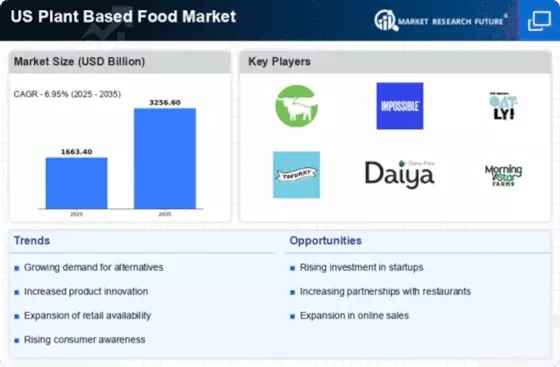The Plant Based Food Market is currently characterized by a dynamic competitive landscape, driven by increasing consumer demand for sustainable and health-conscious food options. Major players such as Beyond Meat (US), Impossible Foods (US), and Oatly (SE) are at the forefront, each adopting distinct strategies to enhance their market presence. Beyond Meat (US) focuses on innovation, particularly in developing new product lines that cater to diverse dietary preferences, while Impossible Foods (US) emphasizes partnerships with major food service providers to expand its reach. Oatly (SE), on the other hand, has been concentrating on regional expansion, particularly in North America, to capitalize on the growing popularity of oat-based products. Collectively, these strategies contribute to a competitive environment that is increasingly shaped by innovation and consumer preferences.
Key business tactics within the market include localizing manufacturing and optimizing supply chains to enhance efficiency and reduce costs. The competitive structure appears moderately fragmented, with numerous players vying for market share. However, the influence of key players is substantial, as they set trends and standards that smaller companies often follow. This competitive dynamic fosters an environment where innovation and responsiveness to consumer trends are paramount.
In December 2025, Beyond Meat (US) announced a partnership with a leading fast-food chain to introduce a new line of plant-based burgers. This strategic move is likely to enhance brand visibility and accessibility, positioning Beyond Meat (US) as a go-to option for consumers seeking convenient plant-based meals. The collaboration underscores the importance of aligning with established food service entities to drive growth in a competitive market.
In November 2025, Impossible Foods (US) launched a new product line featuring plant-based seafood alternatives. This diversification strategy not only broadens their product portfolio but also taps into the growing consumer interest in sustainable seafood options. By expanding into this niche, Impossible Foods (US) may capture a new segment of environmentally conscious consumers, further solidifying its market position.
In October 2025, Oatly (SE) unveiled plans to invest in a new production facility in the US, aimed at increasing its manufacturing capacity for oat-based products. This investment reflects Oatly's commitment to meeting rising demand and enhancing supply chain reliability. By bolstering its production capabilities, Oatly (SE) is likely to improve its competitive edge in a market that increasingly values sustainability and local sourcing.
As of January 2026, current competitive trends in the Plant Based Food Market are heavily influenced by digitalization, sustainability initiatives, and the integration of AI technologies in production processes. Strategic alliances are becoming increasingly vital, as companies seek to leverage shared resources and expertise to navigate the complexities of the market. Looking ahead, competitive differentiation is expected to evolve, with a pronounced shift from price-based competition to a focus on innovation, technological advancements, and supply chain reliability. This transition may redefine how companies position themselves in the market, emphasizing the importance of adaptability and forward-thinking strategies.

















